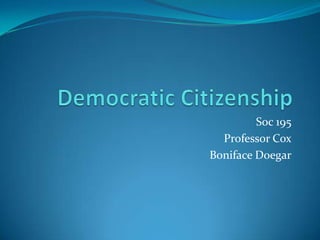
Boniface Doegar Sociology Presentation
- 1. Soc 195 Professor Cox Boniface Doegar
- 2. What does it mean to live in a democracy? A democracy is a form of government in which control of the government rest with the citizens "Of the people, for the people." To live in a democracy is to have the right to participate in the governance of your country, be it directly through elected position or indirectly by voting for the candidate of your choice.
- 3. What is your role of a citizen? Democracy works when citizens participate, if they do not or are disenfranchise or not allowed to participate, the government ceases to be a democracy and is instead ruled by the few willing and able to participate. Therefore, to live in a democracy is to take self-responsibility and participate in the governance process.
- 4. Topics patriotic Economics Social Justice Race and Society Democracy
- 5. Patriotic Being Patriotic is to show support for your country. It could be wearing a shirt with the American flag on it or hanging an American flag from your front porch. To me, to be patriotic, means to know your country's history and never intend to repeat it. To do your duty and vote in the election. Help one another out, get involved in change for the better.
- 6. Patriotic We can not celebrate patriotism out of control. Some people might go out of control by doing heavy drinking and partying a lot, all that is unnecessary.
- 7. Economics Economics is the study of the production and consumption of goods and the transfer of wealth to produce and obtain those goods. Economics explains how people interact within markets to get what they want or accomplish certain goals. All functional members of society are responsible for upholding our collective agreement (laws).
- 8. Economics The implication is that not only will we follow our rules and laws, we will not have others breaking the rules. All citizens need to obey the rules set by the government to protect each other.
- 9. Social Justice Society is our collective way of having our individual needs met. One of our individual needs that society provides for is the safety of all its members. Ideally, societal rules are set and agreed to by all members of society, or as is in our case in the Unites States, through elected representatives.
- 10. Social Justice Through these systems, society strives for just outcomes. Human systems, much like humans, are not perfect, and so we are continually questioning the rules and systems we make to create a more just world. Citizens should give back in ways to that will benefits our children
- 11. Race and Society Race and ethnicity in some ways go together. An ethnic group is a group that has a distinct culture of its own. It tends to be a group that shares an ancestral heritage. Society is a community of people living in a particular region and having shared customs, laws, and organizations. Citizens have moral responsibility to follow a just law and conversely we have a moral responsibility to disobey unjust laws.
- 12. Race and Society Citizens have to work together instead of having favoritism for one ethnic group. Malala Yousutzai stood up for what she believe in, and she lost her life in the outcome
- 13. Race and Society Example During the semester, I read about a 14 years old girl, Malala Yousutzai in Pakistan. Malala has received worldwide recognition for standing up publicly, and in opposition to a Taliban decree, for the education of girls in Pakistan. She attends a school for girls run by her father. Forbidding girls access to equal education is unjust, and Malala's actions are therefore just. Today, Malala was shot in the head by a Taliban warrior who boarded her school bus and demanded to know which child she was.
- 14. Democracy In order for a democracy to work, it is important that the people have knowledge about the definition of democracy and how it works. Thus it is highly important for a country to have a relevant educated population in order for the democratic system to work
- 15. Democracy Citizen need to have a good education because uneducated people tend to lean towards radical ideologies as these ideologies might seem to have a sufficient solution to the problems of the society, however what people usually fail to see or even ignore is that these solution are based on suppression of other groups in society which usually doesn't affect the majority 1. -Welzel, Christian, and Ronald Inglehart. "The Role of Ordinary People in Democratization." Journal of Democracy 126-140 19.2008 (2008): 1-15. Print.